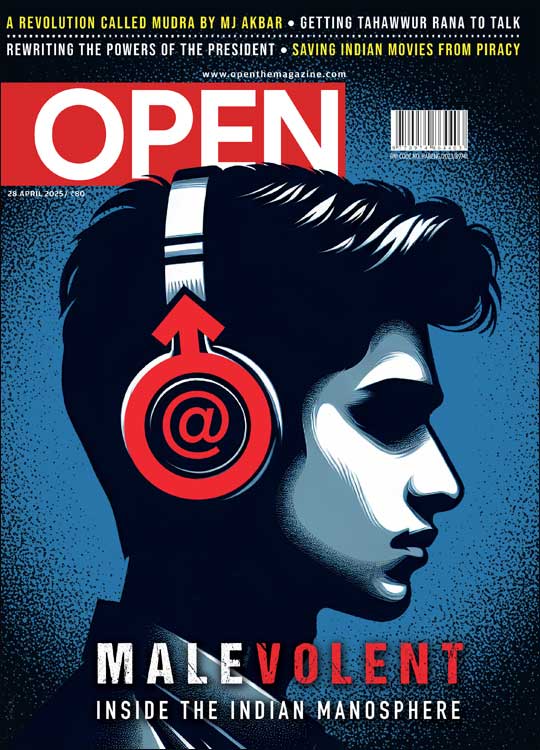The Sin of Binayak Sen
The sentencing of Binayak Sen by the Raipur Sessions Court is a measure of the Chhattisgarh government’s desperation to finesse its record of human rights violations
 Sudeep Chakravarti
Sudeep Chakravarti
 Sudeep Chakravarti
Sudeep Chakravarti
 |
30 Dec, 2010
|
30 Dec, 2010
/wp-content/uploads/2015/11/binayak2.jpg)
The sentencing of Sen by the Raipur Sessions Court is a measure of the Chhattisgarh government’s desperation to finesse its record of human rights violations
Does offering Binayak Sen hospitality in my home this past summer— an hour’s conversation and two glasses of kokum sherbet—constitute helping the Maoist cause, or an unlawful activity? In the eyes of law and justice as we know it in Chhattisgarh, it probably does.
We chatted about the need for Sen, then out on unconditional bail granted by the Supreme Court of India in May 2009, to rest after two years in jail; for his wife to recuperate from a tangle with cancer; and for the family to spend time together after a treacherous separation. I also suggested to Sen, a doctor who trained at Christian Medical College, Vellore, and human rights activist, that he begin to put his thoughts down on paper or into a tape recorder. What he had to say of his experiences in Chhattisgarh over several decades would make compelling reading. I offered to help him in the endeavour of a book.
I have two reliable witnesses: Sen’s wife Ilina and elder daughter Pranhita, who would both swear we did no wrong. In Chhattisgarh, this probably wouldn’t fly in the face of government gumption. In the last week of December, a Sessions Court in Raipur handed down to Sen on the flimsiest of evidence a sentence of life imprisonment for unlawful activities.
He was seen as aiding Maoists, first by visiting jailed Maoist ideologue Narayan Sanyal—with the written permission of Chhattisgarh police, and as representing the People’s Union for Civil Liberties, of which he was a vice-president. Then he was purported to have sent letters from Sanyal to a Kolkata-based businessman called Piyush Guha. A postcard from Sanyal found in Sen’s home—and presented as evidence—by the police contained details of Sanyal’s health and legal issues, and duly carried the seal of the jail authorities. The clinching testimony of Sen’s complicity was apparently provided by a cloth merchant, who claimed to have overheard conversations.
Sentencing Sanyal was easy enough; he is a Maoist. And Guha confessed to the police, under conditions that were at best murky, that he was handed letters by Sen. And Sen, well, why is there a hunt for Sen? Especially when the Supreme Court found enough reason to grant him bail on the basis of the same evidence that has now been used by the Raipur court to hang him out to dry?
The simplest explanation is that Sen got in the way of the Chhattisgarh government and terribly embarrassed the state’s establishment—in particular, Chief Minister Raman Singh—and the state’s crony-plan to do business.
Sen highlighted and publicised the Malik Makbuja system. It was a form of corruption by which tribals have for several years been scammed out of valuable timber on their land by colluding traders and politicians. He later lifted the lid off Salwa Judum (‘Purification Hunt’, in the local Gondi dialect), which has since 2005, through state sponsorship, destroyed villages in south Chhattisgarh and forcibly resettled tens of thousands into concentration camp-like horrors to deny Maoists shelter, recruits and network. Exceeding the energy of the Maoist rebels they accuse of brutality, police, paramilitary and Salwa Judum recruits have in concert freely killed unarmed men, women and children.
As the state fought back with overkill, Sen suggested that the Salwa Judum could have been created to help business interests. He named the Tata, Essar and Jindal business houses, among others. The government, he suggested, hadn’t safeguarded the interests of tribal and forest dwellers before trading their futures for Rs 17,000 crore in memoranda signed with businesses from home and abroad to mine iron ore and diamonds, and to set up iron and steel and power plants.
In a way, as I have written earlier, what Sen did was similar to what Medha Patkar tried for those displaced by the Sardar Sarovar project, or Aruna Roy to empower the poor and powerless with the right to information. Only, there wasn’t and isn’t a state of ‘civil war’, whatever that means, on Patkar’s or Roy’s patch.
Moreover, like Sen and many others, I too have seen, with some surprise and consternation, the spread of business in Chhattisgarh’s conflict-ridden south, where several marquee projects are to rise. I can understand if conflict arises after a corporation has set up a mine or factory in a particular area. But what business does a corporation have to wilfully go into a conflict area even as the conflict is still raging? Or, plan to go into an area—signing deals with various state governments and so on — when the conflict is ongoing? There are numerous examples of state governments using the doctrine of Eminent Domain to procure land for ‘public good’, and then selling it or allocating it to businesses. This is, in human rights terms, both highly questionable and illegal. I believe enough evidence exists to hold corporations, both Indian and transnational, culpable of, directly or indirectly, trying to end conflict by force, and even of allowing for collateral damage in the killing and dislocation of innocent populations, rather than urging the state to first sort itself out.
A time will soon come when Indian companies will begin to be sued in class action cases by both people in India and those overseas. Indian corporations with a global footprint will also suffer. Vedanta Resources Plc is a good example. I believe more businesses will begin to suffer legally and financially as the world at large begins to learn that they operate in a sledgehammer fashion in India, and present angelic faces elsewhere in the world.
Sen’s steady disclosures brought media in increasing numbers to Chhattisgarh. What they found was not only a story of Maoists gaining ground—which had generally been suppressed by the euphoria of India’s mall stupor—but the absolutely scandalous way in which the Salwa Judum was operating, supported by leaders of the opposition Congress— among them an architect of the move, Mahendra Karma—in concert with the BJP administration led by Raman Singh. They had taken a legitimate grouse against the strong-arm tactics of Maoists to control the life of villagers and forest- dwellers in Maoist areas of operation, and transformed it into a cynical, socially destructive vigilante exercise in which tribal threatened, maimed and killed tribal. Human rights activists were chased and threatened. A police intercept Maoists shared with the media — which I also excerpted in my book Red Sun: Travels in Naxalite Country—showed how a Salwa Judum operation was being planned by the superintendent of police of the Bijapur police district in Dantewada, during which he speaks of how villagers have been told their homes will be razed if they don’t come away to camps. He also spoke of killing any journalist seen in the area.
A steady stream of such disclosures raised the Blood Diamond-esque profile of Chhattisgarh in India and abroad. Sen was marked. His arrest finally came in May 2007.
In July 2008, Sen’s younger brother Dipankar, then a successful oil industry executive based in Belgium, filmmaker Sudhir Mishra and I met Vishwaranjan, Chhattisgarh’s director general of police in Raipur. Mishra, a childhood friend of Dipankar, and I were there as observers. By then, in several court hearings, the case for the prosecution had proved hollow, and some witnesses for the prosecution had turned hostile. This, in Chhattisgarh! Senior Chhattisgarh administration officials admitted that higher courts could ultimately dismiss the case against Binayak on points of law, while lower courts, closer to imperatives that drive the politics of Chhattisgarh, would be less moved.
Dipankar, Mishra and I heard a similar line from Vishwaranjan with some dread but no surprise. The director general of police offered us time, coffee, a short discussion on poetry. And commiseration that at least Sen’s wife Ilina was not jailed too, as she had suffered enough emotionally, and could look after the children (the Sens’ daughters, Pranhita and Aparajita). There was a bizarre suggestion that the administration had actually moved on compassionate grounds.
From what we could gather, the simple yet chilling truth was that the political masters of Chhattisgarh had not been provided—or had been unable to come up with—a face-saving strategy for withdrawal. It is the same as in the case of Salwa Judum, which is now little else but a PR noose around the state’s neck, no matter that Home Ministry officials claim Salwa Judum is dead. In Delhi, conventional wisdom among even strongly nationalistic security analysts remains: if there is strong evidence of wrongdoing against Sen—or, for that matter, anyone— prosecute. In Chhattisgarh, there are officials who admitted to me in private that left to themselves, they would have intensified the watch over Sen to ascertain links with Maoists—not arrested him in a massive fit of pique, also designed to scare off activists in general.
Just how desperate Chhattisgarh’s need is to finesse its record of human rights violations in general and Salwa Judum in particular came to me directly the same year.
In mid-2008, I was invited to be part of an academic advisory group of a forensics and criminology institute run by the Ministry of Home Affairs in New Delhi. I agreed, as the person heading the institute, an officer of the rank of inspector general of police, had earlier formed part of anti-Naxal operations at the ministry, and with this interaction I hoped to understand better the State’s view of the rebellion. In the matter of a few weeks, the real reason for the group—a collection of academicians, retired judges, serving mid-level bureaucrats and I—was made clear: an ‘independent’ study on the benefits and flaws of Salwa Judum.
Basically, we were to arrive at various camps run by Salwa Judum, including some new ones, and ask: “Were you forced by Salwa Judum to come here? Or did you come here of your own accord, frightened by Maoists?” All along, of course, we would be provided close security by the state and Salwa Judum toughs, to ensure both the safety of our lives— imagine the negotiating conundrum if Maoists captured a police officer of the rank of inspector-general—and, evidently, of a much-shepherded freedom of expression.
I acquiesced, frankly, out of great curiosity about how such a group would progress. All along, I had made my views on Salwa Judum abundantly clear. Perhaps the study group needed a token dissident in me. But I had nothing to lose, and only insight to gain.
The funds for the study were duly routed through the Political Science department of Delhi University, a professor of the department, also a part of the study group, designated its leader, and the project was a “go”. We gathered in Raipur on 2 October 2008. Most arrived from Delhi; I travelled from Goa, my present home. At a briefing the same evening, we were told that we didn’t have much time for the study—that some of the group had to return to Delhi in time for Durga Puja and Dussehra celebrations!—but a helicopter already under charter to the Chhattisgarh government, primarily for operations in Bastar and Dantewada, would be available from the following day for two days. This would enable us to make quick forays into admittedly inaccessible terrain deep inside Dantewada, made so by distance, deep jungle, and the utter Maoist domination of the area.
On the morning of 3 October, three of us piled into the civilian Bell Jet Ranger III, owned by Dhillon Aviation and leased to the Chhattisgarh government through an intermediary, Mesco Aviation. We took off from the police barracks helipad in the heart of Raipur. (The remainder of the team would join us in Dantewada town the same evening after driving south from Raipur). There was a refuelling stop in Jagdalpur, the district headquarters of Bastar, and then a 45- minute hop to Dornapal.
However, upon landing at the disused, collapsed stadium that now acted as a helipad, ringed by the festering, baking slums that passed for Salwa Judum resettlements, the senior police officer decided the Dornapal camp was “too old” for our purposes. We flew the short, 20-minute hop to Jagargunda, deep into the jungles to the west.
This area, for all practical purposes, is Maoist territory. Jagargunda, now a broken village, is completely cut off. Weapons and food supplies, for both paramilitary and Salwa Judum camps, have to be either trucked in every three months with heavily armed convoys or choppered in. As we landed, the senior police officer admonished a guard for saluting him—a potential giveaway for Maoist sharpshooters on any of the hillsides that overlooked the landing zone, a small clearing in the forest. Just weeks earlier, the same helicopter had a bullet shot through its rotor. The Austrian pilot had with ingenuity taped a sheet of plastic on the small hole and managed to take off.
Our interview with inmates of the Salwa Judum camp, ringed by barbed wire and razor wire, and guarded on every side by guard posts, was farcical.
We stopped near some mud huts, after walking down a narrow strip of road in grand procession. The camp housed nearly 3,000 people from several villages and hamlets in the area, among them Milanpalli, Kunder, Tarlagada and Kudmer. It seemed the entire camp, children included, were with us.
“Kisne laya tumko?” the police officer barked at the crowd in Hindi. A bureaucrat accompanying us, a tribal lady, hadn’t the Muria dialect these people spoke. A Salwa Judum recruit was translating back and forth in broken Hindi. “Maobadi ke darr se aya ki Salwa Judum wale laya? Theek-theek batao, darne ki koi baat nahin.” Who or what brought you? Your fear of Maoists, or did the Salwa Judum bring you? Tell us the truth, don’t be afraid.
It seemed an unlikely place for straight answers, surrounded as we were by several hundred people and heavily armed paramilitary and armed SPOs (special police officers).
Finally, Uika Massa, a husk of a lady, answered: “Ramesh and Munna brought us here.”
Who were Ramesh and Munna? She waved around vaguely. Nobody was able to tell. The senior police officer looked furious with the non-response, and was not too pleased with my suggestion to the effect ‘what did you expect?’
Markam Massa, another resident, formerly a village elder of Kunder, only 4 km or so away, could offer us little more than insight into their previous lives: an average of 6-7 acres of holding and farmland, some cattle, goats. The once-upon-a-usual. Every four months or so, he said, some villagers would make the trek to the village under heavy protection to perform puja to deities at the village. That protection didn’t always work, he said. Just the day before, a person from the village was “taken away” by Maoists.
“This is a joke,” I finally grumbled to the police officer. “How can you expect to conduct a proper interview in a few minutes with so many people around? How can we expect any answers with senior officers, SPOs and weapons around?”
‘Interviews’ over, we walked over to the CRPF camp, had tea with the troops, were shown how they had planted a kitchen garden by the perimeter to supplement rations, and took off in a tight spiral—to avoid overflying Maoist positions. Total time spent in Jagargunda, all told: 1 hour, 15 minutes. By 4.30 pm the same day, we had arrived at Dantewada. The following day, we drove to Kasoli village, an hour’s drive north, for more desultory interaction, and later that afternoon flew to Jagdalpur, our overnight base before a journey back to Raipur and our homes.
In a few weeks, along with others, I received an email from the Delhi University professor, saying there was little time to compile the report, that he had already begun to write it, and could we send ‘bullet points’ for him to add, ‘if required’. A telephonic row with him followed, during which I raged about how this study was being forced, was grossly inadequate, that we were to submit full reports that would be published individually, without biased intervention, and that the Chhattisgarh elections were due in just a few weeks, suggesting, of course, that the report could be used as a Salwa Judum whitewash by anyone who cared. I put my dissent on record in an email, and sent it off to the professor of political science and the police officer.
I haven’t heard from them since.
Is my reporting this unlawful? In Chhattisgarh, it probably is.
Well, ‘unlawful’ will have brought Sen back to Raipur Central Jail, decorated as it is with patriotic bells and whistles. A bust of Subhash Chandra Bose painted in Bollywood silver rests in front of the arched entrance. On either side of it are similarly adorned busts of Mohandas Gandhi and Vivekananda. Inside, the reception area is a jumble of registers, a framed print of a goddess, dusty close-circuit TV screen, and nervous supplicants. There’s also a marble plaque with the names of the freedom fighters incarcerated in Raipur jail during the long-ago years of activism for ideal nationhood.
“People tell me I may be safer in jail,” Binayak told me when I visited him during his earlier incarceration, in July 2008. “Outside, anything can happen.”
His family and friends fear that may no longer hold true. Inside is enough.
But there are other truths.
There will soon be no space left in the jails of Chhattisgarh and elsewhere in India if dissent is taken as unlawful, as sedition— a colonial attitude.
Raman Singh and his colleagues ought to know that an accusation of wrongdoing against them or their government is at best a matter of libel. It is not a matter of sedition or conspiracy against the state. Singh is Chief Minister for the time the electorate and his party permit him. He is not the state. He is a servant of the public, guaranteed by the Constitution of India and bound by the oath of office he has taken.
Is this unlawful? It probably is, in Chhattisgarh.
About The Author
CURRENT ISSUE
MOst Popular
3

/wp-content/uploads/2025/04/Cover-Manosphere.jpg)











More Columns
‘Colonialism Is a Kind of Theft,’ says Abdulrazak Gurnah Nandini Nair
Bill Aitken (1934 – 2025): Man of the Mountains Nandini Nair
The Pink Office Saumyaa Vohra